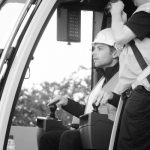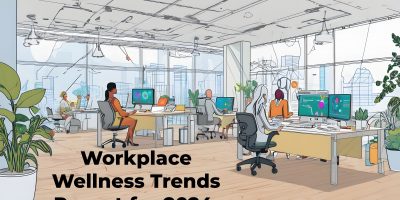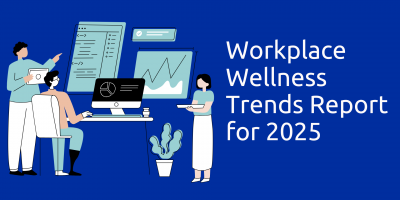
Workplace Wellness Trends Report for 2022
Explore Shortlister’s corporate wellness industry trends for 2022, addressed in collaboration with outstanding CEOs, HR practitioners, and wellness professionals.


Broadcast Journalist & PR Professional

Marketing Manager at Joloda

Marketing, Operations & Coaching Expert

Founder & Leadership Coach of Third Space People

Founder of West Vic Web

Chief Activation Officer at Activate 180
People’s way of thinking can shape almost all aspects of their personal and professional lives. On average, employees spend approximately 100,000 hours at work, so one’s mindset in the workplace can significantly impact their overall work experience and career development.
In the workplace, employees often face different challenges or failures. However, what is important is how they view and cope with them. Usually, workers perceive obstacles in two ways: as a learning opportunity or a threat to their image.
According to psychology expert Carol Dweck, this reflects the two types of mindsets: fixed mindset vs. growth mindset.
People with a fixed mindset consider abilities and skills as “fixed” traits. Because of this, they usually don’t focus on change or development, and they don’t want to work beyond the score of their role. Thus, they tend to back down and avoid a challenge whenever it arises.
In contrast, a growth mindset helps people achieve their full potential because they see failures as learning opportunities. A growth-focused person believes that they can develop intelligence and talent through experience.
This article offers professionals’ perspectives and opinions to outline the difference between a fixed mindset and a growth mindset.
Founder and leadership coach of Third Space People, Hareta McMullin, gave a short description of the difference between a growth mindset and a fixed mindset stating: “Often those with open minds can be described as a leaner or a learner.
A fixed mindset is the understanding that talent and intelligence are inherent.
Since that is the way people are born, they can’t change or develop. Therefore, they are prone to look at effort as pointless since they believe that success depends on the level of inborn abilities.
Fixed mindsets are fearful of venturing out of their comfort zone. Their fear of making mistakes prevents them from taking risks or developing skills they are actually capable of. If they make a mistake, they try to hide it from others because they are susceptible to seeing it as a flaw in their character.
Zach Smith, chief activation officer and co-founder of Activate 180, a trusted voice in mindset for over ten years, provided his point of view on fixed-minded people. He said: “Because fixed mindsets lack resilience, individuals may throw in the towel if they feel their initial efforts are imperfect or unsuccessful.
Although they are unwilling to work hard to achieve their goals, those with fixed mindsets continue to feel threatened by the success of others, whether close peers or strangers. As a result of the above qualities, individuals with fixed mindsets struggle to flourish within a myriad of settings.”
A growth mindset is a belief that intelligence, talent, and abilities are learnable and expandable. Effort stands as a crucial element of success. It is normal to fail when trying, but failure is a learning opportunity, not a menace.
According to Zach Smith, “These individuals choose to learn from the criticism of others and are inspired or driven by the success of those around them. Individuals with growth mindsets view gaps in their expertise as opportunities for mental, physical, or psychological improvement.”
Growth-oriented people don’t carry any weight of expectations.
They don’t worry about what a mistake will mean and how it’ll make them look. Instead, they challenge themselves because challenges are exciting rather than threatening.
Zach Smith agrees with this sentiment, adding: “It is commonly thought that work ethic determines accomplishment among those who are growth-minded. This leads growth-oriented individuals to embrace challenges and persist regardless of difficult setbacks. Overall, individuals with growth mindsets believe that their effort and eagerness to learn will result in a mastery of skills they view as invaluable.”
Hareta McMullin provided a list of characteristics of a growth-minded people. According to her:
It’s not only individuals who fall into the fixed mindset vs. growth mindset categories.
Companies and organizations can also be inclined towards more traditional or growth mindset strategies in the workplace.
Gary Warner, a marketing manager at Joloda, provided his perspective on the difference between employees with a growth mindset vs. a fixed mindset. “A growth-oriented employee should be able to see the bigger picture for the business, not only understanding how they have an impact on this but also how the rest of their team fit in. They should be able to adapt and also support others through change.
The growth-oriented employee will go that extra mile to learn about the business and other businesses within the same industry. They will be looking at ways to influence change in the workplace to help the business stand out.
In contrast, an employee with a fixed mindset could be considered to be stuck in a rut. They will keep doing what they’ve always done, as it’s served them well so far. They may not be as innovative when it comes to thinking of solutions and are more likely to seek support than give it.
Having a fixed mindset will reduce an individual’s capacity to progress through the business, as they will likely be focused on the role that they are in without investigating other options available.”
Employees focused on growth are eager to embrace new challenges and feel enthusiastic about learning new skills.
They are inspired by others’ success and believe that work ethic and effort are the main drivers of positive outcomes. They follow their passions and dreams. They concentrate on the process that brings success rather than on the result.
Unlike them, fixed-mind workers tend to be afraid to admit they lack knowledge, thus avoiding taking on new tasks. Therefore, they are inclined to stand by the jobs they know they can perform. Since they don’t think they can develop new skills, they often resort to cheating and deception to present themselves as more intelligent and accomplished.
Anna Sallows, from Leading Teams, provided another distinction of a fixed vs. growth mindset, emphasizing the importance of a growth mindset at work. She said, “Our team talks about character vs. competence when recruiting people.
Competence is skills to do the job, and character is how this person will engage with the team and add culture.
If you only hire for competence, it can breed a culture of fixed mindsets. Everyone is focused on doing their job and doesn’t care how they interact with others or how their team performs. A growth mindset means that someone is willing to learn, grow and develop themselves and others, and it is a key attribute for all team members and leaders.”
When it comes to companies, a growth-oriented one promotes hard work and resilience over inherent skills. Hence, employees have stronger motivation to be productive.
In addition, the support that the personnel have for learning and improving skills creates a workforce that is ready to tackle many different challenges. And since workers are empowered to present new ideas, innovation and creativity flourish.
Broadcast Journalist & PR professional Tony Nicholls believes that titles and seniority are not part of a growth environment. According to him, “Team members simply just rise to the roles and responsibilities they’re keen to do, keen to try or keen to expand into. That’s really exciting.
I want candidates to remember that growth happens outside of their comfort zone.
If they think about the role or parts of the role they’re doing really well, they probably were really uncomfortable with doing those things early on.
That’s how it works.
Whatever someone feels uncomfortable with right now, whether it’s the new part of their role or the new skill they’re adapting to, they’ll soon nail that. Then there’ll be something new to feel uncomfortable doing because that’s a new skill they’re starting to develop.
Growth happens outside an employee’s comfort zone, and it’s a good thing because it means they’re expanding, getting better, and building a great career.”
On the other hand, a business with a fixed mindset creates a culture where employees feel afraid of making mistakes, thus lacking the motivation to take risks. And since such a culture values inborn abilities and pedigrees, the workforce will focus on their inherent skills and repeat doing only what they already know.
A fixed mindset in a workplace leaves no space for new ideas and innovation. This hinders the future growth of a company and its employees as they remain stagnant and focused on what they believe to know best.
And since employees only prioritize tasks they master, they see constructive feedback as an attack on their personality. This creates a tense relationship between employers and personnel.
The tension is additionally strengthened because employers often divide workers into competent and incompetent. And they hire only the “competent” people according to solid credentials. In addition, only the “competent” get praises based on their skills instead of effort and improvement.
However, even though there are significantly more drawbacks to a fixed mindset vs. a growth mindset, it doesn’t mean that the first is destructive in its nature. In fact, there might be instances when it works well. For example, in a company that performs manual tasks that are more detail-oriented, it is best to have a worker who is a master of a particular skill; thus, hiring on skillset might come in handy for certain businesses.
When comparing a fixed mindset vs. a growth mindset, more of the evidence emphasizes the latter’s benefits. A study conducted among Fortune 1000 companies highlights several benefits of a growth mindset in the workplace.
According to the findings, a business that promotes development makes 65% of employees feel supported to take risks. This fosters a culture of creativity and innovation, and 45% agree with this regard.
In addition, 35% are ready to go out of their way to ensure the company is successful. In return, they make a long-term commitment and are less likely to leave the workplace than those who work in a fixed-mindset company.
Among workers in a growth-oriented workplace, there is a 47% higher agreement that they have more trust in the company and are ready to take full responsibility for their work.
And all these benefits that employees enjoy, promotes a positive working relationship between them and their employers. In fact, leaders who foster a culture of development have a positive attitude toward their personnel. They see their workers as more innovative and creative and ready to learn new skills and grow.
Zach Smith additionally highlights the importance of a positive relationship between growth-oriented employers and employees. “The relationships that growth-oriented employees have with their employers are mutually beneficial.”

All in all, there are multitudinous benefits of a growth mindset in the workplace.
As a matter of fact, Microsoft is a clear example of how much a company can boost its performance if the focus is put on growth.
However, there might be instances where this mindset is not appropriate. For example, suppose a business hires only growth-oriented employees. In that case, everybody will focus on coming up with new ideas and developing new skills. Thus, the workforce will lack scrupulous and meticulous experts to carry out the tasks.
In reality, companies and employees often declare to have a growth mindset when they actually don’t. In fact, they have what Dweck calls a “false” growth mindset. This happens when people believe that being growth-minded means being open-minded or optimistic.
Moreover, companies that focus on rewarding effort also fall under a “false” growth mindset. After all, even though a growth mindset emphasizes effort, it highlights the processes that led to the positive outcome even more.
And believing that the positive outcomes will come only by espousing a growth mindset doesn’t make a company growth-minded. A business that implements policies that encourages risks that work out, supports collaboration, and provides growth opportunities is a business that promotes and reinforces a growth mindset at the workplace.
Many growth examples rely on a person’s mindset, from financial stability to building skills.
Financial success is heavily dependent on financial literacy. According to a survey, 57% of Americans are financially literate, compared to 33% worldwide.
To be financially literate, a person must be willing to improve their knowledge and skills needed to make better financial decisions. And this is where a growth mindset comes in place. If a person’s thinking patterns are focused on growth, obtaining financial literacy is a challenge they will happily undertake, thus improving their financial stability.
According to research, professional skills have a life expectancy of five years. Therefore, it is vital that people constantly upgrade their knowledge, especially for their work.
Growth mindsets benefit in this aspect because figuring out new things is an exciting puzzle for them. As Tony Nicholls said, “A growth mindset is a key value of this business, and we actually hire on that.
We’ve chosen staff because they’ve got a growth mindset because they’re ambitious, like trying new things, attack new tasks with enthusiasm, and are happy to build new skills.”
A growth mindset promotes learning and upgrading new abilities and skills. And improving knowledge is what furthers career growth. Therefore, it is clear that a growth mindset can do wonders for entrepreneurs‘ and employees’ careers alike.
Tony Nicholls reflects this by saying: “That’s really important in a small and growing business because someone’s responsibilities can change quickly and expand quickly, but that’s totally cool for people with a growth mindset because they’re excited about the new.”
A growth mindset is a powerful asset for organizational growth. As the name itself suggests, it promotes growth, which results in continuous improvement and success. There are specific ways to foster a growth mindset in the workplace. Zach Smith reported several strategies an employer can use.
In addition, Adam Kelly from WestVic Web provided strategies their company uses to encourage a growth mindset. “Here’s how we encourage our team at WestVic Web to adopt a growth mindset:
If a task doesn’t come easily, remind yourself that it isn’t a reflection of your inherent worth but an opportunity to learn and improve.
And research shows that considering a growth mindset for a few moments before starting a task can improve performance.
Rather than seek out opportunities to repeatedly prove abilities, look for challenges that may encourage learning and growth.
Look for these opportunities to practice perseverance and learn from mistakes. Over time, a “growth” mindset can become an unconscious response.”
It is the leaders who set the mindset perspective of the entire organization. And it is a leader’s mindset that significantly impacts employees’ work ethic.
A leader who promotes growth values effort and learning above abilities. They encourage taking risks and help their teams deal with and learn from them. However, when a failure happens, they are the ones who bear responsibility. Therefore, employees feel more comfortable trying their hand at new experiences.
In a culture-of-development company, leaders support employees’ growth.
They invest in them and their knowledge by creating a high learning culture. According to research, a company that embraces learning is 92% more likely to innovate, 58% readier to meet future demand, and increases employee productivity by 37%.
Even though it might seem like an impossible process to shift from a fixed mindset to a growth one, it is attainable. Contrary to popular belief, neuroplasticity, i.e., the ability for the brain to change and grow new brain cells, doesn’t stop in childhood but is present throughout the whole life.
Therefore, since research shows that mindsets are responsive to certain triggers like environments and feedback, some steps can help one make a mindset change.
The first step toward the change is realizing that being open-minded and flexible is not the same as having a growth mindset. To be growth-minded means to be open to new experiences in life. It means not giving up when facing a setback but finding a way to overcome the obstacle.
Going out of the comfort zone and trying out unfamiliar things is another stepping stone toward growth-mindedness. Acknowledging and embracing one’s strengths and weaknesses can help venture on a new path to growth. It also helps to see challenges as opportunities, develop strategies to deal with them, and turn them into positive experiences.
Evidence suggests that when comparing a fixed mindset vs. a growth mindset, the latter has more advantages over the first. It fosters many growth opportunities for companies and their employees.
Nevertheless, people should beware of the false growth mindset. What is essential is to clearly distinguish between growth vs. fixed mindset and have the necessary skills to ascertain which one is the better alternative in a situation.
Browse our curated list of vendors to find the best solution for your needs.
Subscribe to our newsletter for the latest trends, expert tips, and workplace insights!

Explore Shortlister’s corporate wellness industry trends for 2022, addressed in collaboration with outstanding CEOs, HR practitioners, and wellness professionals.

In a world reshaped by AI, cost pressures, and disengaged employees, which employee benefits strategies will help your business thrive in 2024?

This research explores internal and external buyer trends to support brokers, vendors, employers, HR professionals, and consultants in crafting effective human capital strategies for 2025.
Used by most of the top employee benefits consultants in the US, Shortlister is where you can find, research and select HR and benefits vendors for your clients.
Shortlister helps you reach your ideal prospects. Claim your free account to control your message and receive employer, consultant and health plan leads.